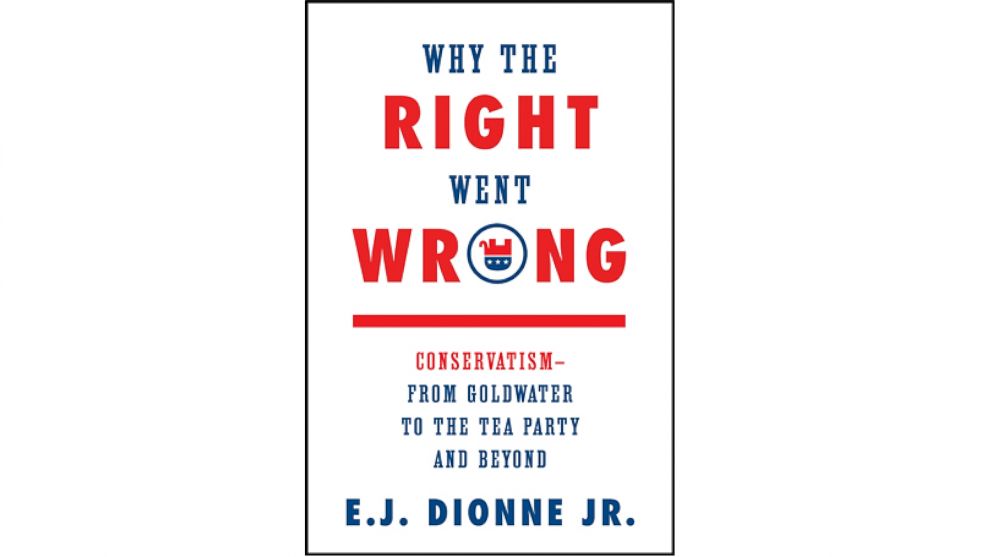Book Excerpt: EJ Dionne's 'Why the Right Went Wrong'

— -- Excerpted from Why the Right Went Wrong: Conservatism—From Goldwater to the Tea Party and Beyond by E.J. Dionne. Copyright © 2016 by E.J. Dionne. Reprinted by permission of Simon & Schuster, Inc. All Rights Reserved.
Introduction: What Happened to Conservatism? Why Reforming the Country Requires Transforming the Right
The history of contemporary American conservatism is a story of disappointment and betrayal. For a half century, conservative politicians have made promises to their supporters that they could not keep. They offered stirring oratory that was not commensurate to what was possible. They described a small government utopia that was impractical and politically unsustainable because it required wrenching changes to government that most Americans didn’t want. They denounced decades of change, pledging what amounted to a return to the government and the economy of the 1890s, the cultural norms of the 1950s, and, in more recent times, the ethnic makeup of the country in the 1940s. This proved to be far beyond the capacity of politics. Most Americans—including a great many who were neither very liberal nor radical, and especially the young—did not want to go back.
Conservatives have won many elections since their movement began to take control of the Republican Party more than a half century ago. But these victories produced neither the lasting electoral realignment that conservative prophets kept predicting nor the broad policy changes the faithful hoped for. For the rank-and-file right, the sense that their leaders had failed them and the political system had shortchanged them created a cycle of radicalization. We are living with its fruits today.
The Trumpification of Republican politics during the summer of 2015 provided gaudy confirmation that something is amiss. It’s true that Donald Trump’s unlikely insurgency reflected the complete fusion of the culture of celebrity with politics that the billionaire builder, television star, birther, and self-promoter perfected. His rise could certainly be seen as part of a distemper that bred a mood of anti-Establishment protest across the world’s democracies. But the deeper ideological force behind Trumpism is rooted in history. It was compactly summarized by Erick Erickson, editor of the popular right wing blog RedState. “The Republican Party created Donald Trump,” he said, “because they made a lot of promises to their base and never kept them.”
It is a problem that goes a long way back. Since 1968, no conservative administration—not Richard Nixon’s, not Ronald Reagan’s, and neither of the Bush presidencies—could live up to the rhetoric conservative politicians deployed to rally their supporters. Their appeals were rooted in the aspirations of the Goldwater movement that began reshaping American politics fifty years ago. The hopes Goldwater inspired were regularly frustrated. In response, movement conservatives advanced an ever purer ideology, certain that doing so would eventually bring them the triumphs that had eluded them over and over.
Consider the steady march rightward. The collapse of the Nixon presidency led to the rise of Ronald Reagan. The defeat of George H. W. Bush led to Newt Gingrich’s revolution. The reelection of Bill Clinton pushed Republicans to impeach him. The partial exception to this pattern is George W. Bush. Yet by the time his second term was over, the cycle reasserted itself as his failures led to the rise of the Tea Party.




